Non-vegan elements in food disguise: Not all visibly vegan products are truly vegan
In the world of veganism, it's not always easy to tell which foods are truly animal-free. Some products, often mistakenly assumed to be vegan, may contain surprising animal-derived substances. Let's explore some common culprits.
Muesli, a popular breakfast choice, might contain gelatin, a common additive derived from animal bones. This gives the cereal its unique texture. Similarly, gelatin is often used in the production of gummy bears, providing them with their distinctive chewiness.
L-cysteine, an additive found in bread and rolls, is another substance to be aware of. This ingredient can be derived from hair or feathers, and it helps make the dough fluffier.
Fruits, generally speaking, do not contain animal-derived substances. However, exceptions may occur due to processing or additives. For instance, bananas may be sprayed with a protective coating based on shrimp shells to deter insects. Jam, particularly the intensely red varieties, may contain carmine, a dye derived from cochineal insects.
Pasta can sometimes contain egg, making it unsuitable for a vegan diet. Beer is another product to consider, especially if it was not brewed according to the German purity law and comes from abroad. It may contain gelatin, especially if the beer was not brewed in compliance with the German purity law.
In Germany, many products may contain animal-derived ingredients like gelatin but are not labeled as vegan. This is largely due to strict EU regulations that prevent the use of terms like 'vegan sausage' or 'vegan meat,' and products with animal parts must be labeled accordingly, preventing a vegan label even if some animal products are minimally present or processed.
However, stricter regulations for organic products can help vegans avoid animal-derived substances in their food. Many manufacturers use stricter regulations for organic products that restrict the use of animal substances.
To ensure a product is truly vegan, consumers should look for clear labels and vegan labels. Being cautious when consuming pasta, gummy bears, muesli, bread, and rolls is essential, as these foods may contain hidden non-vegan ingredients. Always read the labels carefully and consider the origin of the product to make informed decisions about what you consume.
Read also:
- Countries initiate efforts to prohibit smoking within vehicles
- Backed by Scientific Evidence, 11 Strong Arguments for Almond Appreciation
- Administration's effort to dismiss thousands of Health and Human Services employees denied by the court
- Funds amounting to approximately 1.17 million euros designated for local meetings regarding nursing practices





